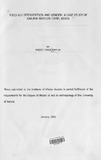| dc.description.abstract | This study, carried out between November and December 2002, made deliberate efforts
to investigate gender relations in regard to food aid among refugees at the Kakuma
Refugee Camp. The Camp, situated in the arid Turkana District of Northwest Kenya, is
the second largest shelter site for refugees in the country. Using gender as a key factor
that influences the vulnerability and capacities of individuals and households to feed
themselves, the overall objective of this study was to investigate how gender relations
influence the use of food aid in the camp. The first specific objective was to assess
gender considerations in food aid distribution. The participation of individual members of
households in the food aid distribution programmes was examined. To investigate the
effect of gender roles in the utilization of food aid at the household level was the second
specific objective of this study. The third specific objective was to assess the impact of
these gender roles on decision-making regarding utilization of food aid.
The methods used in the data collection included: structured interviews, focus group
discussions, key informant interviews, direct observation, and library search.
Questionnaire responses were obtained from a sample of 192 refugees originating from
four nations, namely, Somalia, Sudan, Rwanda and Ethiopia, which had been picked
randomly from the 9 nationality groupings (Sudan, Somalia, Ethiopia, Rwanda, Burundi,
Uganda, Democratic Republic of ConEO, Eritrea, and Angola) within the camp. To
analyse qualitative data, information was coded to establish trends while for quantitative
data, the Statistical Package for Social Sciences was used. The information has been
presented inform of tables and a bar chart.
The study reveals that all groups of refugees at Kakuma Refugee Camp are heavily
dependent upon the general ration as their main source of food as there are hardly any
realistic alternative sources of food. This has generally reduced men's ability to provide
for their families whereas food aid distribution has resulted in increased responsibilities
for women. Women groups of different sorts have been formed within the camp that
have enabled women to take up wider public and family roles, thereby increasing their
capacities and reducing their vulnerabilities. The refugees' survival was found to not only
depend on sufficient food aid provision, which is on the decline, but also on the
strengthening of the community members coping mechanisms. This study, consequently,
recommends that gender issues related to food aid rationing and management be
addressed by organizations involved in food aid interventions. Generally, the principle of
refugee self-reliance should be promoted pending voluntary repatriation, local integration
or resettlement. | en |

